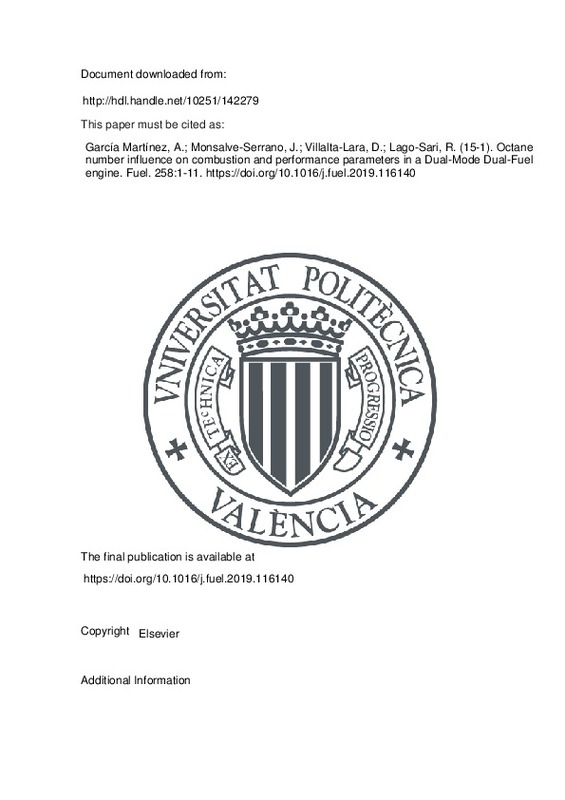JavaScript is disabled for your browser. Some features of this site may not work without it.
Buscar en RiuNet
Listar
Mi cuenta
Estadísticas
Ayuda RiuNet
Admin. UPV
Octane number influence on combustion and performance parameters in a Dual-Mode Dual-Fuel engine
Mostrar el registro sencillo del ítem
Ficheros en el ítem
| dc.contributor.author | García Martínez, Antonio
|
es_ES |
| dc.contributor.author | Monsalve-Serrano, Javier
|
es_ES |
| dc.contributor.author | Villalta-Lara, David
|
es_ES |
| dc.contributor.author | Lago-Sari, Rafael
|
es_ES |
| dc.date.accessioned | 2020-05-05T06:18:42Z | |
| dc.date.available | 2020-05-05T06:18:42Z | |
| dc.date.issued | 2019-12-15 | es_ES |
| dc.identifier.issn | 0016-2361 | es_ES |
| dc.identifier.uri | http://hdl.handle.net/10251/142279 | |
| dc.description.abstract | [EN] Low temperature combustion stands as a promising alternative to realize low soot and NOx emissions while achieving fuel consumption benefits compared to the conventional diesel combustion. Nonetheless, its applicability is limited to narrow zones inside the engine map, reducing the potential benefits on a real driving case. In this scenario, the use of dual-mode dual-fuel combustion stands as an alternative to cover engine conditions up to full load, avoiding the constraints of the fully premixed combustion whenever is needed. This combustion concept is strongly influenced by the characteristics of the fuels that are used to create the charge stratification during the engine operation. The current research aims to evaluate the influence of the low reactivity fuel octane number on the combustion process and the average performance and emissions results. Additionally, the best octane number was determined by means of a merit function evaluation. Octane values of 100, 92.5, 87.5, 85 and 80 were obtained by blending iso-octane and heptane. Their performance was assessed in a medium-duty multi-cylinder platform at different representative operating conditions. The results suggest that fuels with octane number lower than 92.5 have a low impact at low load conditions. However, as load is increased, the high reactivity of the low research octane number fuels leads to early combustion processes, demanding settings modifications to avoid the appearance of excessive pressure gradients. As a consequence of these modifications, the fuel consumption and soot emissions increase. In general, RONs from 92.5 to 87.5 are less penalized, presenting the best merit function values, and therefore being the best fuels to be used in the hardware under investigation. | es_ES |
| dc.description.sponsorship | The authors thanks VOLVO Group Trucks Technology and ARAMCO Overseas Company for supporting this research. The authors also acknowledge FEDER and Spanish Ministerio de Economía y Competitividad for partially supporting this research through TRANCO project (TRA2017-87694-R) and the Universitat Politècnica de València for partially supporting this research through Convocatoria de ayudas a Primeros Proyectos de Investigación (PAID-06-18). | es_ES |
| dc.language | Inglés | es_ES |
| dc.publisher | Elsevier | es_ES |
| dc.relation.ispartof | Fuel | es_ES |
| dc.rights | Reserva de todos los derechos | es_ES |
| dc.subject | Dual fuel combustión | es_ES |
| dc.subject | Primary reference fuel | es_ES |
| dc.subject | Emissions | es_ES |
| dc.subject | Reactivity controlled compression ignition | es_ES |
| dc.subject | RON influence | es_ES |
| dc.subject | Octane number | es_ES |
| dc.subject.classification | MAQUINAS Y MOTORES TERMICOS | es_ES |
| dc.title | Octane number influence on combustion and performance parameters in a Dual-Mode Dual-Fuel engine | es_ES |
| dc.type | Artículo | es_ES |
| dc.identifier.doi | 10.1016/j.fuel.2019.116140 | es_ES |
| dc.relation.projectID | info:eu-repo/grantAgreement/UPV//PAID-06-18/ | es_ES |
| dc.relation.projectID | info:eu-repo/grantAgreement/AEI/Plan Estatal de Investigación Científica y Técnica y de Innovación 2013-2016/TRA2017-87694-R/ES/REDUCCION DE CO2 EN EL TRANSPORTE MEDIANTE LA INYECCION DIRECTA DUAL-FUEL DE BIOCOMBUSTIBLES DE SEGUNDA GENERACION/ | es_ES |
| dc.relation.projectID | info:eu-repo/grantAgreement/UPV//SP20180148/ | es_ES |
| dc.rights.accessRights | Abierto | es_ES |
| dc.contributor.affiliation | Universitat Politècnica de València. Departamento de Máquinas y Motores Térmicos - Departament de Màquines i Motors Tèrmics | es_ES |
| dc.description.bibliographicCitation | García Martínez, A.; Monsalve-Serrano, J.; Villalta-Lara, D.; Lago-Sari, R. (2019). Octane number influence on combustion and performance parameters in a Dual-Mode Dual-Fuel engine. Fuel. 258:1-11. https://doi.org/10.1016/j.fuel.2019.116140 | es_ES |
| dc.description.accrualMethod | S | es_ES |
| dc.relation.publisherversion | https://doi.org/10.1016/j.fuel.2019.116140 | es_ES |
| dc.description.upvformatpinicio | 1 | es_ES |
| dc.description.upvformatpfin | 11 | es_ES |
| dc.type.version | info:eu-repo/semantics/publishedVersion | es_ES |
| dc.description.volume | 258 | es_ES |
| dc.relation.pasarela | S\392952 | es_ES |
| dc.contributor.funder | Agencia Estatal de Investigación | es_ES |
| dc.contributor.funder | European Regional Development Fund | es_ES |
| dc.contributor.funder | Volvo Group Trucks Technology | es_ES |
| dc.contributor.funder | Universitat Politècnica de València | es_ES |
| dc.contributor.funder | ARAMCO Overseas Company |







![[Cerrado]](/themes/UPV/images/candado.png)

